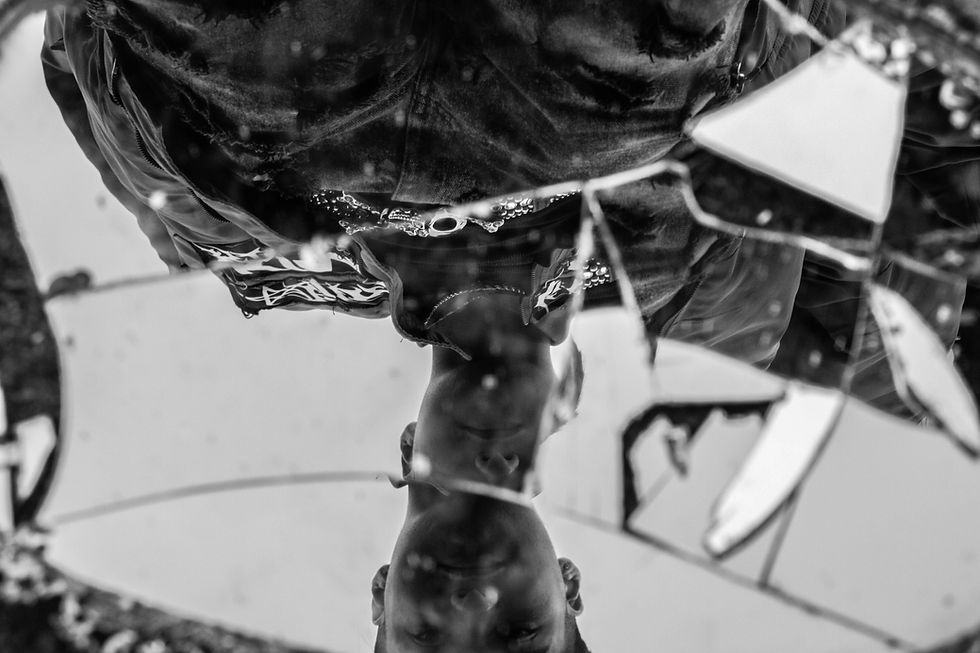The Fiction of Self
- sancharim946

- Jul 23, 2025
- 5 min read
Updated: Jul 30, 2025
What if the person you think you are doesn’t really exist? What if “you” are not a solid, fixed being—but a shifting narrative stitched together from half-remembered moments, borrowed language, and recycled emotions? What if the self is not a truth to discover, but a story you keep telling to stay coherent in a chaotic world?
This isn’t just a poetic metaphor. It’s a serious philosophical and psychological idea—that the self is a narrative construction, a fiction we write and rewrite, not because it’s true, but because it’s necessary.

Humans are storytelling creatures. We crave meaning. We fear chaos. So we build plots, connect memories, assign motivations, and call it identity. But underneath the story, what is there? And what happens when the story falls apart?
Let’s unravel the myth of the self—one chapter at a time
The idea that the self is a narrative isn’t new. Philosopher Paul Ricoeur called it narrative identity—the concept that we make sense of who we are by crafting a story about our past, present, and future. We are, as he puts it, not just beings who act but beings who recount.
Think of how you introduce yourself to a stranger. You tell a version of your life. Where you were born. What you studied. What you’ve been through. You leave out details. You highlight others. You package it all into a neat, linear tale. But life isn’t neat. It’s full of contradictions, half-truths, and repressed chaos. The story is a filter, not a mirror
Memory plays a central role here—and it’s far less reliable than we like to believe. Neuroscientists like Antonio Damasio have shown that memory is not a fixed recording, but a constant reconstruction. Each time you remember something, you slightly alter it. You fill in blanks. You change tones. You even swap events. What you remember is not what happened, but what you believe happened, based on who you are now.

So the self—if built on memory—is built on sand.
Now bring trauma into the equation. Trauma disrupts the story. It tears pages out of the narrative, scrambles chronology, leaves blacked-out sentences in the middle of otherwise logical paragraphs. People with PTSD often report a fragmentation of self—feeling like their past doesn’t belong to them, like they’re split into before and after. Trauma makes it hard to tell a coherent story. And yet, healing often involves trying to reconstruct one.
Therapist and author Bessel van der Kolk, in his book The Body Keeps the Score, emphasizes that trauma is stored not just in the brain, but in the body. This means your story isn’t just mental—it’s physical. You carry it in your posture, your nervous system, your gut reactions. But because trauma resists language, it often gets left out of the “official” self-narrative. You become a stranger to your own story.
And then there’s performance. Sociologist Erving Goffman famously argued in The Presentation of Self in Everyday Life that we are all actors on metaphorical stages. We perform different versions of ourselves in different contexts—at work, with friends, online, alone. We wear masks not to deceive, but to survive
This performative self isn’t fake—it’s just fragmented. You don’t have one core “you.” You are plural. You are modular. A collection of roles, costumes, and tones. And yet, to function in society, you must believe there’s a unified character behind all the performances. A protagonist. A stable self.

But what if that unity is an illusion?
Consider how often we edit ourselves. We delete parts of our personality to fit into jobs, relationships, families. We are told to be “authentic,” but punished for being too real. We craft our digital selves like authors of a novel, selecting the flattering angle, the witty caption, the filtered mood. Social media turns identity into content, selfhood into branding. And yet we cling to the idea that beneath all this, there is a real me waiting to be uncovered.
But what if there isn’t?
Buddhist philosophy has long challenged the idea of a permanent self. The concept of "anatta"—non-self—proposes that the self is an illusion, a process, not a substance. We are aggregates of sensations, thoughts, perceptions, and consciousness, constantly changing. Holding onto a fixed identity causes suffering, because it resists the flow of reality.
Western philosophy occasionally echoes this. David Hume famously said, “I never can catch myself without a perception.” When he looked inward, he found no stable self—only a bundle of experiences.
And yet, we resist this idea. We want to believe we are more than stories. That there’s something essential, unchangeable, “truly us.” Maybe because without that belief, things get terrifying.
If the self is a story, then who is the author? Can you rewrite it? What happens when others try to edit your narrative for you—parents, governments, lovers, society?

Here lies the danger and the potential. If identity is a story, it can be stolen, silenced, rewritten against your will. Think of how colonialism erased indigenous identities by imposing new stories—names, languages, religions. Think of how patriarchal systems rewrite women’s narratives into passive, decorative ones. Narrative identity is not always self-authored. It is often contested terrain.
But there’s also power in recognizing the story. Because if the self is constructed, then it can also be reclaimed.
Writers and artists know this instinctively. Memoir, fiction, poetry—these are tools of identity-making, of pulling fragments into coherence. In retelling your story, you don’t just report who you are—you create who you might become.
But coherence is not the only goal. Maybe it’s okay for your narrative to remain unfinished, contradictory, even incoherent. Maybe wholeness is not about being one thing, but about allowing yourself to be many things at once.
So what if the self is just a story?
Maybe that’s not a weakness, but a freedom. Stories change. They grow. They break and mend. You are not trapped by who you’ve been. You are not bound to a single plotline. You are a living revision.
In a world obsessed with certainty, identity, and definition, embracing the narrative self is a radical act. It is saying: I am not finished. I am not fixed. I am still writing.
And maybe, in that writing, you’ll find not a single truth—but something even better: movement, possibility, and the quiet beauty of being endlessly rewritten.
About the Author
I am Sanchari Mukherjee, a student doing Masters in English from the reputed Presidency University, Calcutta. I love writing and appreciate art in all forms. Being a literature major, I have learnt to critically comment on things of various kinds. I take a deep interest in deconstructing the various essential structures and revealing the mechanisms of their working. Really glad that you came across my blog, hope you found it covering some critical insights essential for progress!




Comments